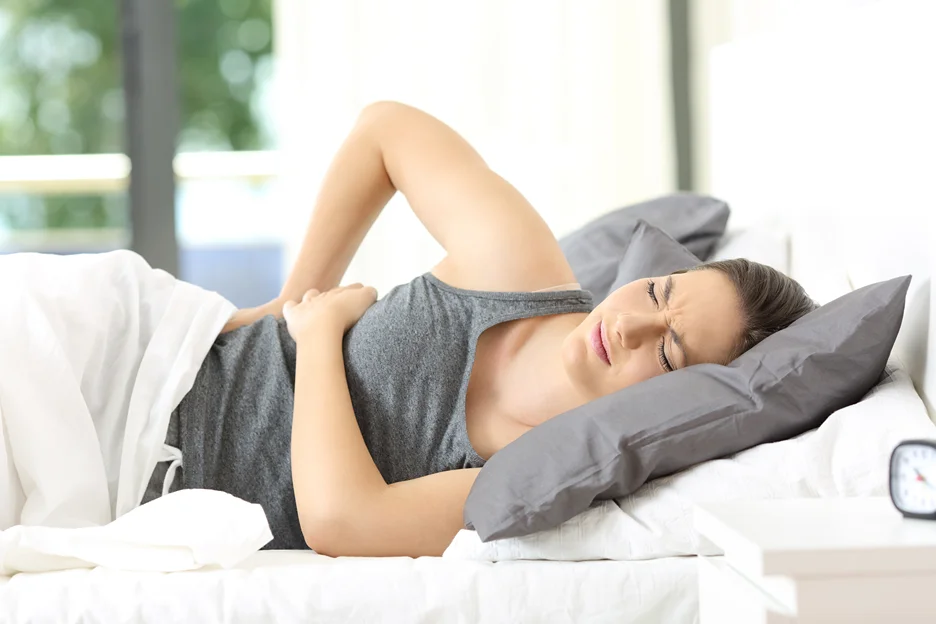If you’re one of the millions of adults living with chronic lower back pain, you know how agonizing it can be when the ache intensifies every time you lie down.
Kaly is your trusted partner in managing chronic back pain. We’re here to provide expert-backed solutions to help you alleviate lower back discomfort when lying down.
Our goal is to empower you with the knowledge and tools to improve your pain, sleep better, and wake up re-energized.
Before we look at how to find relief, it helps to understand what’s behind your back pain when lying down.
Why Does My Lower Back Hurt After Lying Down?
It’s the end of a long day and all you want to do is crawl into bed. But as soon as your back hits the mattress, your lower back erupts in pain. What gives?
There are a few key reasons you may experience lower back pain when you lie down, including:
- Strain from Daily Activities – Your back muscles have been working hard all day supporting your upright posture and movement against gravity. Lying down takes pressure off the back muscles, which can cause them to spasm painfully.
- Poor Mattress Support – If your mattress sags or fails to support your lower back’s natural curve, this misalignment can trigger muscle tension and pain when lying down.
- Pinched Nerve or Compressed Disc – A vertebrae shift or disc issue in the spine may get aggravated when changing positions from upright to lying down. This can pinch nerves and cause sharp lower back pain.
- Arthritis or Spinal Problems – Conditions like spinal stenosis, spondylolisthesis, arthritis, and degenerative disc disease can flare up when lying down and worsen pain.
Getting to the root cause of your lower back discomfort will allow you to take steps to get relief when lying down. Talk to your doctor for an evaluation if pain persists.
What Is the Best Sleep Position for Lower Back Pain?
Not all lying down positions are created equal when it comes to lower back pain. The way you sleep and align your spine impacts how your body weight gets distributed and how relaxed or strained the back muscles become overnight.
Finding the optimal sleep position can significantly ease lower back pain symptoms when lying in bed. Here are the best positions to try:
- Side Sleeping – Resting on your side in a fetal-like position with knees bent is often recommended. You can place a pillow between your knees to better align the hips and spine.
- On the Back with Knees Elevated – This allows the lower back to maintain its natural curve without flattening out completely. Place pillows under the knees for support.
- Avoid Sleeping on Stomach – This twists the neck and lower back, which can aggravate pain. If you must sleep on your stomach, place a thin pillow under your pelvis to minimize back arching.
Experiment with pillow props, mattress incline, and posture corrections until you find the right position for your back. As pain improves, you may be able to adjust to lying flatter. Listen to your body!
Why Does Lower Back Pain Worsen When Sitting and Lying Down?

There are some key reasons for this:
- Sitting and lying both take pressure off your back compared to upright standing where the muscles work against gravity. This reduction in muscle exertion can cause inflammation and back stiffness.
- Prolonged sitting and lying lead to inactivity, which allows back muscles to tighten up. Gentle movement is needed to keep the blood flowing.
- Herniated discs may shift and compress nerve roots when adjusting positions from standing to sitting or lying.
Try easy knee-to-chest stretches before prolonged sitting or lying down to help elongate the lower back. Regular movement breaks will also prevent muscles from stiffening up and worsening pain.
Why Do I Experience Lower Back Spasms When Lying Down?
Lower back spasms when lying down typically stem from:
- Sudden Changes in Position – Transitioning your back muscles from upright activity to a lying position alters tension and can cause them to spasm.
- Poor Mattress Support – A too-soft mattress that sags in the middle can pull your spine out of alignment and trigger lower back spasms.
- Irritated Nerves or Discs – Compressed or inflamed nerves due to issues like a herniated disc can manifest as sudden spasmodic pains.
- Dehydration – Being dehydrated causes widespread muscle cramps and contractions which can strike the lower back when lying down. Drink plenty of water and replenish electrolytes.
How to Alleviate Lower Back Pain When Lying Down
Applying targeted strategies for how you sleep and lie down can go a long way toward alleviating stubborn lower back pain and letting you rest comfortably. Try these tips:
- Use a Firm Mattress – Soft mattresses allow the back to sink in unnaturally. A firmer surface keeps the spine properly aligned.
- Sleep with Knees Elevated – Place pillows under or between the knees when lying on your back to reduce curvature in the lower spine.
- Apply Heat or Ice – Heating pads relax muscles while ice packs reduce inflammation. Use whichever feels best to your back.
- Perform Gentle Stretches – Try yoga poses like child’s pose and knee-to-chest that gently extend the lower back before bed.
- Take Over-the-Counter Medication – Anti-inflammatory meds like ibuprofen can temporarily relieve pain and reduce swelling.
- Consult a Doctor for Muscle Relaxers – If spasms and pain persist, prescription muscle relaxant medications may help.
Adjustable beds that allow you to customize mattress incline and leg height can also minimize pain at night. The key is finding positions that keep your spine happy and lower back muscles relaxed when lying down. Be patient and do some trial and error.
Why Does My Hip and Lower Back Hurt When Lying Down?
Do you notice a deep ache in your hip and lower back when you lie down to sleep at night? There are some common reasons for this dual pain:
- Referred Pain from Tight Hip Flexors – When the hip flexor muscles are very tight and shortened, they can pull on the lower back muscles and create lower back soreness when lying down.
- Hip Bursitis – Inflammation of the bursa sacs around the hips from arthritis or overuse can flare up at night when pressure is placed on the affected side while lying.
Try placing a pillow between your knees when sleeping on your side to better align your hips and take pressure off the lower back. Stretches that target the hip flexors and glutes can also help relieve referred back pain.
Why Does the Right Side of My Lower Back Hurt When Lying Down?
Lower back pain only on the right side when lying down often stems from an issue in the sacroiliac joint or leg length discrepancy tilting the pelvis. Placing a pillow under the longer leg’s knee when lying on your back can stabilize the pelvis and minimize uneven muscle stretching on that side to relieve the pain.
Why Does My Lower Back Hurt More at Night?
Back pain often worsens at night due to muscles tightening after supporting your body all day and old mattresses losing support for spinal alignment when lying down. Upgrading to a supportive mattress and doing gentle lower back stretches before bed can help ease this common issue.
Why Does My Lower Back Hurt When I Try to Sit Up from Lying Down?
Lower back pain when sitting up often results from abrupt, improper movements straining muscles or shifting bulging discs. Roll on your side first, then slowly rise using core strength rather than pulling up with your back. Go one vertebrae at a time, keeping knees bent to minimize disc pressure and avoid aggravating the pain.
Your Path to Pain-Free Rest

At Kaly, we don’t just provide educational resources – we connect those suffering from chronic back pain with a vast network of specialized providers who can help create customized treatment plans. Our holistic platform allows you to find accredited pain management specialists, physical therapists, chiropractors, and more.
